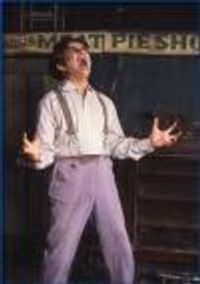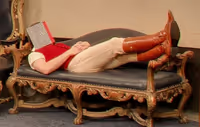WSJ: What’s Wrong With The Broadway Musical?
#25What's wrong with Broadway?
Posted: 5/11/18 at 6:29pm
Not to be ageist, but Terry Teachout is 62. Of course he longs for the "good old days" of Fiddler on the Roof. However, people like him are not Broadway's concern at the moment - in fact, even regional theaters should no longer care about what retirement age people think is good.
I am optimistic about the future of musical theater, as musicals are being written and produced that young people would actually want to go see. Things like The Band's Visit are mostly for "theater people," and that's fine. Give it the Tony, sure. But shows that appeal to people in their teens and twenties like Dear Evan Hansen and Mean Girls - whether they are based on a movie or not - are what will keep people going to the theatre. Theater snobs complain about the pop scores, but it's a mirror of the so-called "golden age": musicals are employing popular music styles. Cole Porter used to be pop music. They may not play the scores to Broadway musicals on the radio anymore, but instead, musicals are being written with the kind of music people like to listen to on the radio. Tastes in music have changed, and Broadway is rolling with it. And for audience members who want a more traditional pseudo-Sondheim or R&H musical, we still have plenty of those.
Musical theatre is doing just fine. Now if you want to talk about an art form that is in serious trouble, let's talk about realism-based straight plays that don't have movie stars in them.
#27What's wrong with Broadway?
Posted: 5/12/18 at 1:57pm
I'm sorry, but this article was hogwash.
Teachout cites Hair as the last time a Broadway showtune charted, while ignoring that the media landscape around Broadway has changed drastically over the last half-century. I don't think there is any reason inherent in the music why a song from any number of recent musicals couldn't chart if given the chance and the right arrangement/performer. However, commercial radio has become largely consolidated into the hands of a small group of corporations (Entercom, iHeartMedia, Cumulus), and has become homogenized and monopolized because playlists are standardized across the country. This extends also to television. As Teachout mentions, we once had Ed Sullivan and other variety shows that would showcase everything from classical music, opera, ballet to musical theatre to Little Richard. Now we don't really have many advocates on network TV for Broadway (excepting maybe Stephen Colbert and James Cordon), and it's been largely relegated to PBS. Why is Teachout blaming Broadway for this (or, more nebulously, which I'll describe below, blaming the musical landscape at large), and not the media landscape in which it is embedded?
Also, this statement betrays what a musical vacuum in which this man has lived: "Back then, everybody from Frank Sinatra to Elvis Presley to Ray Charles sang show tunes. Their musical language was universal: They spoke for us all."
No, they didn't speak for us all. Broadway has always been a largely middle class phenomenon. Elvis Presley didn't speak a universal language: he made music by black people (the blues and gospel stylings of Big Mama Thornton, Sister Loretta Tharpe, et al.) and poor white people (what was once called "hillbilly music", bluegrass, roots, country, etc.) more palatable for a middlebrow audience. The sound of the "Golden Age" musicals also did not appear out of nowhere, as a pure "universal" sound, in an of itself. It evolved out of highbrow artforms like opera and more bourgeous operetta, mixing in influences from Jewish and black musical forms (think of Porgy and Bess as the intermediate stage in its evolution), only after decades of tinkering become more accessible to a wider audience. And still, even in the 1960s, it remained fairly middle class.
The musical landscape has always been fragmented, and largely along class, race, and regional lines. Poor people have listened to different music than rich people, black people have listened to different music than white people, etc. I'm not saying this to be divisionist, or to imply that it's always categorically so. We have always had white musicians and fans who admired black musicians, and poor people who have a penchant for opera, and vice versa. It's simply to go against this obscurantist narrative posited by Teachout in the article. He is musically sheltered if he thinks "musical theatre spoke for all of us."
Teachout also noticeably omits any mention of the success of La La Land, which appealed to and reached a huge audience. It's a Hollywood musical, but written by Pasek and Paul, who write primarily for the stage. This suggests to me more prosaic, logistical reasons for the Broadway musical's apparent "failure." You got access to La La Land by paying $8-20 at any movie theatre in the country. You don't get that access to a musical where tickets cost ten times that much. Furthermore, there has been a cultural shift around musical theatre as an artform: the rise of the motion picture has rendered the stage somewhat hard to palate for many people. Movies themselves have become less theatrical, with a greater emphasis on naturalism and realism, in the last 60 years. A stage play, or a musical in which characters break into song, is a hard sell for much of the country, for whom a night at the theatre is not a social affair.
Ironically, the Internet has democratized the musical world in many ways, and I think young people listen to a greater diversity of music than before, and musical theatre has a much greater chance than ever to speak to a wider range of audiences. This is partly why so much of the lifeblood of musical theatre of late has come from young people: they're the ones who are most likely to use this technology to seek out, share, and engage with music. It's how shows like Avenue Q (remember when "The Internet is for..." went viral on youtube?), Wicked, Hamilton, Dear Evan Hansen, etc. have been able to extend their reach far beyond the relatively few people who have been to see these shows in New York or on tour. This is the future of disseminating musical theatre, not the now-monolpolized commercial airwaves.
Updated On: 5/12/18 at 01:57 PM
#28What's wrong with Broadway?
Posted: 5/12/18 at 2:21pm
Teachout is a contrarian and a conservative. He's also not well schooled in extrapolation skills. Anytime someone attempts generalization regarding the theatre, that's a big red flag. His is fully unfurled. It's good to have this robust discussion generated by his blather, but the bottom line is he is a part of the problem not the solution. The sooner the nostalgia crowd wanes, the better off we will be. Then we can go about the business of making theatre without the distraction.
EdEval
Featured Actor Joined: 11/30/16
#29What's wrong with Broadwy
Posted: 5/12/18 at 5:43pm
Start with a good book or story, usually something English from long ago. Have a wonderful overture. Include two sets of lovers one romantic the other comedic. Besides the solos include rousing chorus ensemble numbers. A ballet sequence included. A happy ending grand finale. There you have it. A receipe for a great classical musical.
#30What's wrong with Broadway?
Posted: 5/12/18 at 5:44pm
Very interesting posts, all. (as someone had noted - in contrast to the original piece)
One thing I find puzzling is his feeling that somehow off-Broadway non-profits are somehow inferior to the old approach of a pre-Broadway tour. Does starting with a profit-driven producer launching a preview tour make the result any more pure? There are many ways for shows to be born. The economics and delivery of mass media, including Broadway have changed. And will continue to change. (And I agree that ticket pricing is a big part of the picture as well.)
A few days ago, I was talking to yet another person whingeing about how uninspiring the current season is and that pre-sold commodities were all that were left on Broadway. I reminded him that some of the most interesting, creative shows have appeared in recent years - Hamilton, Fun Home, DEH, The Curious Incident..., The Band's Visit) and that there have always been up years and down years. (And there has always been a lot of stuff that is best forgotten. And we've forgotten it).
YES - I wish there was more interesting stuff available (Nothing's better than more, more, more) but the fabulous invalid lingers on. ...And I've gotta' say that having 41 theaters active is more a blessing than curse to the theatergoer.
#31What's wrong with Broadway?
Posted: 5/12/18 at 6:17pm
Nothing. Especially if you can only see a handful of shows each year. Pick your spots. We had a year just recently when if any one of the three woulda won, we'd been yeah OK. Streaky.
#32What's wrong with Broadway?
Posted: 5/12/18 at 6:23pmEdEval's recipe for a classic musical, while kind of backwards and definitely not what's in or progressive right now, is an interesting "HOW TO WRITE A LERNER AND LOEWE SHOW" in bullet form.
SharksVsJets
Stand-by Joined: 4/22/17
#34What's wrong with Broadway?
Posted: 5/12/18 at 6:46pmI think the author of the piece is bemoaning that he's not the young stud he was 40 years ago.
#35What's wrong with Broadway?
Posted: 5/12/18 at 7:07pm
By Teachout's rule then shows like A Chorus Line, Grease, Rent, Hair, Sunday in the Park With George are not "real" Broadway shows because all of them started off-Broadway.
#36What's wrong with Broadway?
Posted: 5/12/18 at 8:42pm
Potential shows may have got ‘cold feet’, knowing they were going to compete head to head with Frozen, which was expected to win massive, but people have been deservingly sniffy towards it. If Comet, Groundhog Day or Bright Star open this season instead we wouldn’t be having this conversation.
After Eight
Broadway Legend Joined: 6/5/09
#37What's wrong with Broadway?
Posted: 5/13/18 at 12:13am
There's a good reason the golden age was given that appellation.
Which is why you can expect that designation to be withdrawn and reassigned in very short order.
For you can bet your bottom dollar that those oh-so "enlightened" revisionists wil be telling us that what was deemed golden was really just so much stale beer, and that the real golden age-- or better yet, (why not) --- platinum age --- is the one that has served up such blissful endeavors as Hamilton, Fun Home, Book of Mormon, The Band's Visit, Spring Awakening, Groundhog Day, etc, etc for our unfettered delectation. You see, incomparable gems such as these offer TRUE music to our ears, not the fare served up by the likes of Rodgers, Porter, Kern, Berlin, Loewe, Lane, Styne, Schwartz, Bernstein, Loesser, Herman, etc.
The only problem with all this is that there are some of us who actually lived through the (soon-to-be-repudiated) golden age. We heard with our own ears, saw with our own eyes, and think with our own minds. We know both what was and what is, and refuse to buy the guff the revisionists are selling us.
Yes, you may be able to fool some of the people some of the time, but you can't fool those who know only too well the difference between gold and lead.
green waver
Stand-by Joined: 11/3/16
#38What's wrong with Broadway?
Posted: 5/13/18 at 12:43am
After Eight said: "There's a good reason the golden age was given that appellation.
Which is why you can expect that designationto be withdrawn andreassigned in very short order.
For youcan bet your bottom dollar that those oh-so "enlightened" revisionists wil be tellingus that what was deemed golden was really just so much stale beer, and that the real golden age-- or better yet, (why not) --- platinum age --- is the one that has served upsuch blissful endeavorsas Hamilton, Fun Home, Book of Mormon, The Band's Visit, Spring Awakening, Groundhog Day, etc, etc for our unfettered delectation. You see, incomparablegemssuch astheseoffer TRUE music to our ears, not the fare served up by the likes of Rodgers, Porter, Kern, Berlin, Loewe, Lane, Styne, Schwartz, Bernstein, Loesser, Herman, etc.
The only problem with all this is that there are some of us who actually lived through the(soon-to-be-repudiated) golden age. Weheard with our own ears, saw with our own eyes, andthink with our own minds. We know bothwhat was and what is,andrefuse to buy the guff therevisionists are sellingus.
Yes, you may be able to fool some of the people some of the time, but you can't fool those who know only too well the difference between gold and lead.
Gee AE, I don't think anyone here was denigrating the brilliance of the great musicals of the "Golden Age". I completely reject this artificial division of musical theater into eras. The great works of musical theater have been happy accidents-the right collaborators inspired by the right source materials who were guided by the right producers who hired the perfect cast. My point is, the next Hamilton or West Side Story could be just around the corner, regardless of the era,
"
Oak2
Leading Actor Joined: 8/11/16
#39What's wrong with Broadway?
Posted: 5/13/18 at 1:58am
There is absolutely nothing wrong with the Broadway musical. Our one true lord, the Mouse, has graced us with His presence, and is ushering in a new wave of prosperity by catering to the holiest of cultural missionaries: the tourists. They are the chosen people, and anything that they consume is sacred. This allows the money to keep coming in, so that Broadway has the funds needed for their secret project to clone more Nathan Lanes so that Broadway can finally achieve its true purpose.
#40What's wrong with Broadway?
Posted: 5/13/18 at 2:22am
Something that stands in the way of this era of Broadway musicals producing popular hits are the twin trends of adapting musicals from hit films and of producing jukebox musicals. Jukebox musicals can be great entertainment but I would be reluctant to categorize them as Broadway musicals at all. These productions bypass the risk of a sub-par original score by having the audience already familiar with all the songs before they enter the theater. They add little to the legacy of musical theater.
When popular musical films are turned into Broadway productions, such as Gigi and On the Town and Cinderella and other Disney musicals, again they are avoiding the risk of the show being dragged down by an undistinguished original score. This is pretty important to many when I believe that 80 percent of musicals do not recoup.
In the past, Broadway musical songs became popular hits after films of the musicals were made. The classic "Smoke Gets in Your Eyes," from the musical Roberta is popularized when sung by Irene Dunne in the Astaire/Rogers screen adaptation. "Maria," from the stage to the screen to the lips of Johnny Mathis. "Till There Was You" recorded by every vocalist in existence including Sir Paul McCartney and Ray Charles. (iTunes lists 100 covers for sale before it throws in the towel.) Obviously many more examples.
I sometimes wonder what the Gershwins and DuBose Heyward were thinking when, in the depths of the Great Depression, they rented a theater to put on a three and a half hour opera based on a play by Heyward with a cast of all classically trained African Americans playing out some of the darkest themes in theater history.
Clearly commercial success was not a primary consideration, and to their dedication to art we gained some of our greatest popular music.
#41What's wrong with Broadway?
Posted: 5/13/18 at 4:59am
Times and generations change. And that automatically influences the way demand and supply works.
I think the new generation of let's say, 25+, is a bit lost. Most people who work in the creative sector, like producers and directors and composers seem to be focused on a certain style (mostly the style they were a fan of when they were younger) and are blatantly copying that. What I see most nowadays is uninspired copying. There seems to be a huge admiration for creators and artists from the past, but the only thing I see current creators do is name dropping and admitting they are copying. It's a time of quick successes, quick money and low risks.
If you look at Hamilton for example, it is actually very generic, almost like a musical parody, it has all the cliche's, head flip to audience on last chord, arm up in the air, les Miserables copied costumes and staging, phrases and style copied from hip-hop/rap artists, other songs copied from more classic musicals, just an incoherent mess of styles, scenes and staging. They way of storytelling in that show is actually a big mess, one liners from characters coming out of nowhere, no consistency in storytelling, quickly followed up by a misplaced dance around a character, who's doing a cool posing headflip to the audience of course, overly dramatic but actually taking the piss out of the characters without even realizing it, and many musical parts are like they are written by a 12 year old, especially the instrumentals are high school level. And yet, it is a huge success. Especially amongst youngsters. That says something.
I think that when you look at the new generation of audiences, you notice they are used to a very different kind of music. I will try to explain that with a few very specific examples. From 1997 to let's say 2010 the movies that came out for kids growing up had no real music in it. In that era a certain music style became popular in the charts. The generation before that, from let's say 1988 to 1996, grew up on The Little Mermaid, Beauty and The beast, The Lion King, Aladdin, these films were big deals in society, the music was everywhere, on the radio, on tv, etc. The kids born after that grew up on Dinosaur, Cars, Atlantis, Treasure Planet, Meet the Robinsons Chicken little and Bolt. Generally, the music industry changed too. In the early 90's you would hear a ballad like Whitney Houston's "I will always love you" leading the charts, while in 1997 you would hear "It's not right, it's ok" and "Exhale, shoop shoop" leading the charts. It's safe to say that there is a lot of change going on per generation in 10 years, and the difference, of course, is even more staggering when you watch the difference in 60 years, from let's say a saturday night tv performance of Julie Andrews in the 60's versus a saturday night Nicki Minaj tv performance in 2015. You also see it in, for example the themes of the James Bond movies. These are good examples (Disney classics, Broadway musicals, James Bond movies) because they are a great measuring point over time. "Nobody does it better", "For your eyes only", The spy who loved me", "All time high", made place for "die another day" and "another way to die". The difference in the Eurovision song contest, Oscars, or Grammy's, same thing.
I have always expected this generation (kids who were born in he 90's) would evolve a very different taste than me/other generations, because they grew up with: It's not right but it's ok, treasure planet and die another day. Again, these are all very specific examples.
I think that generation from the past 15 years is also responsible for the success of the movie "Frozen". Growing up deprived of beauty, listening to Nicki Minajs and Kanye West, suddenly a song such as "Let it go" blows their mind and even sounds like singing to them. "A whole new world" not so much, because that has too much melody, it flies over their heads.
These kids will work in the creative sector later too, and obviously will have a different way of thinking than other generations. They might think that shouting is singing and rapping is singing. They might think Idina Menzel is a real singer and Lea Salonga is not because she does not scream. It's cause and effect. And like I said, demand and supply.
One should not underestimate how a person's vision of beauty and taste is formed. It has a lot to do with what you were exposed to as a kid.
You could even argue that something like this is the reason kids wanted to see the Frozen movie and the parents will not go and see the stage version. It could also explain the success for let's say a movie like La La Land, as it seems that many generations are actually longing for something like that. While the generation I described barely paid attention to it.
After Eight
Broadway Legend Joined: 6/5/09
#42What's wrong with Broadway?
Posted: 5/13/18 at 7:02am
OlBlueEyes wrote:
"Jukebox musicals can be great entertainment but I would be reluctant to categorize them as Broadway musicals at all. These productions bypass the risk of a sub-par original score by having the audience already familiar with all the songs before they enter the theater. They add little to the legacy of musical theater."
They may add little to the legacy of musical theatre, but they give audiences something very important that they want: listenable music.
I find the condemnation of jukebox musicals a bit ironic, especially coming from those who wag their figures at us constantly with statements like, "times evolve, and art must evolve with it," "change is natural, change is necessary, change is good," and "everything is for the best in the best of all possible worlds." Well, jukebox musicals represent just such an evolution: so why are people complaining about them?
I'll offer up another adage, amply illustrated here: nature abhors a vacuum. Jukebox musicals fill the vacuum that original musicals have created: providing music that appeals to audiences. Oh yes, I know that the critics bestow torrents of hyperbole on the scores of their pet musicals. They offer music to our ears, so we are told. The problem is our ears tell us otherwise. And our ears are the ultimate judge. The drab, tuneless "music" that the critics go gaga for leaves us quite cold. Jukebox musicals remedy that problem. That's why we have them That's why we need them.
So I see jukebox musicals as a good thing. The songs heard in Mamma Mia, Jersey Boys, Motown, Summer, Beautiful, etc. offer something worth listening to that the critics' darlings do not.
And that's good.
#43What's wrong with Broadway?
Posted: 5/13/18 at 8:48am
I think this relationship between Broadway and Hollywood is worth examining. In the old days, Hollywood got most of its source material from Broadway. Nowadays, the trend has reversed as most Broadway productions originate in Hollywood and get adapted for the stage afterwards.
I'm generalizing of course, but perhaps transferring a stage play to film does not affect its quality as much as taking a cinematic story and adapting it to the stage. Film offers a limitless space, while the stage is finite. Perhaps that's why most film-to-stage adaptations feel forced and less organic.
But why the trend has recently reversed itself poses an interesting question. I'm curious to know your thoughts on this.
#44What's wrong with Broadway?
Posted: 5/13/18 at 9:01amI rarely agree with After Eight, but I do agree on the validity of the jukebox format. Are many/most jukebox shows utter crap? Yes. But the good ones ARE good, in the same way that many/most of the "book is just a vehicle for a bunch of songs, with no solid connective tissue" musicals are utter crap, but Anything Goes is quite good.
#45What's wrong with Broadway?
Posted: 5/13/18 at 9:23am
76Trombones 2 said: "Film offers a limitless space, while the stage is finite. Perhaps that's why most film-to-stage adaptations feel forced and less organic.
But why the trend has recently reversed itself poses an interesting question. I'm curious to know your thoughts on this."
This is interesting, because the Les Mis stage version was much more organic and filmic, while the movie version felt extremely forced and not organic. They were apologizing for singing in the first 4 words of each line and then used a 5 second vibrato on the last word.
To this day, I still do not understand why they were singing in that film. And I also don't understand why it had to be a theatre performance on a pavement in 1 take.
I saw a bunch of actors doing a live performance on a street, struggling with the material and apologizing for it, looking very miserable while doing it. Ending up with only the crying scenes working.
But to come back to your question, I think back in the day, Broadway was where innovative ideas and stories were found, and hollywood saw money. Now it's the other way around because hollywood is where magic is created and Broadway desperately sees money and opportunity in that. Broadway has become a copy machine.
It is frustrating that most people who work in 1 of these worlds seem to completely fail to understand the other. The Phantom of the Opera and Les Miserables were completely massacred on screen. Totally failing to understand the artform of acting through song, making it acting in spite of song. It's the biggest misunderstanding of this century that movie goers are not used to singing and that theatre goers are not used to natural singing. Natural real singing makes a stage show filmic and natural real singing makes a musical film filmic.
https://www.youtube.com/watch?v=Q4NNlEPraKo
I truly hope, one day, in the near future, people will understand this and create a musical film that embraces limitless space, real singing, sung thoughts and showing them with all the filmic editing that is available.
Oak2
Leading Actor Joined: 8/11/16
#46What's wrong with Broadway?
Posted: 5/13/18 at 9:43am
I can't see After Eight's rants as I have it on block/ignore, but I agree with darquegk that jukebox musicals are absolutely valid. I would say they're valid even if they're judged as "utter crap" by the more elitist groups who view themselves as the "real fans" of Broadway. If it creates enough enjoyment and is loved enough by the masses, it's good, regardless of any flaws it might have. The ultimate requirement is just that people enjoy it. If even one person anywhere in the universe enjoys it, for any reason, it's a good show. It will fail if enough people don't like it, of course, but that doesn't mean it shouldn't have existed - as long as it made some people happy, it was worth creating. Positive reactions must take precedence over negative ones. There is no reason to say something shouldn't exist because someone doesn't like it, when they can simply ignore it. There is place on Broadway for all types of shows, and I find the variety we have of shows that cater to various tastes is fine. Even for those who prefer the "classic" "golden age" musical (and I admit I love them as well, though I also like modern ones), that's what Revivals are for, and an occasional new musical that goes by that old route.
#47What's wrong with Broadway?
Posted: 5/13/18 at 11:50am
There is nothing inherently wrong with any category. That's demonstrable.
People don't like shows they don't like. That's a fact, and it is not gonna change. And there will always be shows folks don't like and therefore don't go to see. And we need bad shows as much as we need good ones because if we don't make bad theatre we are not taking the risks we need to take. It's hard to remember but Hamilton was a risk, a big risk.
The problem is that there are not enough good people working in musical theatre. There are historical reasons for this and it is changing some, but it needs to change more. Flushing the nostalgia from musical theatre is job #1. That's forward looking. Teachout of course doesn't work that way.
#48What's wrong with Broadway?
Posted: 5/13/18 at 12:08pm
I'd be interested to learn how folks on this board feel about contemporary opera. It seems to hold a place in the discussions here of legit singing, revival vs. new work, and fading audiences.
I'd avoided opera in the past due to the emphasis on sound over story telling. I want to be told a good story and to connect to a protagonist. If the opera is in English I want to understand the text without reading the super titles. On the rare occasion this occurs I see the power and scope that differentiates opera from musical theater. When it does not occur I concede that I am not opera's target audience.
#49What's wrong with Broadway?
Posted: 5/13/18 at 12:27pm
Have we just run out of creative ideas, period? There are only so many notes in music and ways to configure them. Plays and musicals all have a standard arc — people come together, discover a problem or need for a quest, encounter challenges tackling the problem or quest, and all is eventually resolved. For human characters, how many ways can you write boy-meets-girl in a completely 100% original way?
Videos













